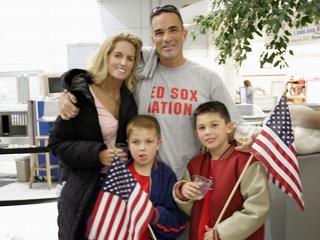
Kim Ruocco, at left, is pictured in November 2004 on the day her husband, Marine Maj. John Ruocco, returned from Iraq. Their sons are, from left, Billy and Joey.
Mrs. Ruocco told Brett how her husband “when he got back from Iraq … became increasingly anxious, depressed and withdrawn, had difficulty eating and sleeping, and didn’t know how to get help without letting everybody down.”
“They’ll do whatever they can do to push those feelings down so they can still function as perceived warriors. That’s how my husband dealt with things. He was always up for the job, he gave it 100 percent. He thought he’d be letting all his younger pilots down and all his Marines down if he went to get help, because they wouldn’t deploy him. He was very good at taking care of his Marines … but not himself,” she said.
Even though Ruocco is a licensed social worker and tried to have her husband seek help, ultimately there was nothing she could do … At the scene of her husband’s death, being questioned by a detective and told by a Catholic priest that her husband was “a sinner,” Ruocco had one overriding thought: “How do you tell two young boys that their dad made it back safely from Iraq after flying all these missions and then took his own life?”
Mrs. Ruocco and her two sons turned for help to a nonprofit organization, TAPS (Tragedy Assistance Program for Survivors), which “provides ongoing emotional support to all who are grieving the death of those who served in the Armed Forces, regardless of the relationship to the deceased or the circumstance of the death.” Years later, she is now director of Suicide Education and Support for TAPS.
There are approximately 900 survivors of suicide in [TAPS’s] database. When [Ruocco] joined the organization, there were only two others. Bonnie Carroll, TAPS’ founder, notes that the true number of families turning to the organization for help because of suicide is probably higher. Many families opt to tell others it was a “death due to non-hostile action.”
“Many of these families, unfairly, feel shame,” said Carroll. “Their loved one served our country with honor, but sustained deep wounds that could not be physically seen. It is a horrific burden that these families carry.”
The North Country Times article tells about Mrs. Ruocco and her sons recently encountering a memorial in their husband’s name near Vance Air Force Base in Oklahoma, where the family was once stationed.
“My son said to me, ‘They’re appreciating how he lived. Someone’s remembering how he lived.’ Because he lived his life sacrificing for everybody. Sometimes when they die by suicide, it wipes all that out. For families who have had this wonderful person who has given so much, and to have it wiped out just by the way they die, is really painful. And so having that memorial fixed that a little bit for us.”
Mrs. Ruocco’s story was also covered in an October 2009 story by ABC News reporter Josh Allen.
[The abridged URL for this post is http://tinyurl.com/RuoccoFamily .]
Related SPNAC posts:
- May 25, 2009 — “TAPS Reaches Out To Military Families Grieving after Suicide — http://tinyurl.com/TAPS-reaches
- Apr. 5, 2009 — “Military, Veteran Stories Focus on Personal Impact of Suicide” — http://tinyurl.com/PersonalImpact
- Mar. 24, 2009 — “Culture of Stigma Is a Key Cause of Military, Veteran Suicides” — http://tinyurl.com/StigmaMilitary
|
Thank you for your story. My son also completed suicide after returning from Iraq. He was always trying to do the right things and never wanted to let anyone down. He was a good man and I hope people will remember him for all the good he did and not by that last final act.